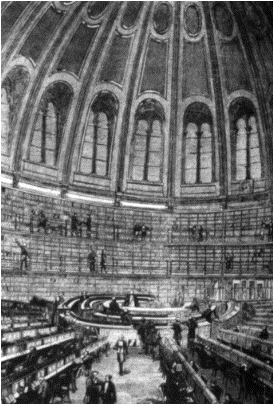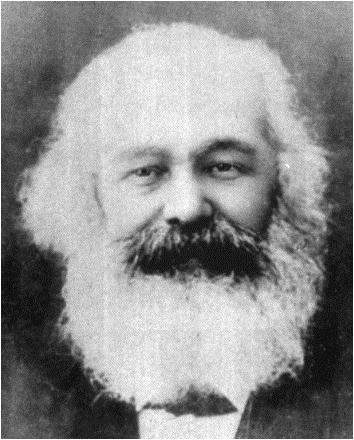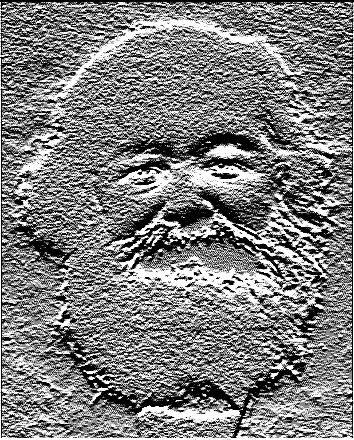Francis Wheen
(Norton)

stands in the German revolution like the notices seen at the corner of certain streets: "It is permitted to pass water here."
Rudolf Schramm:
A rowdy, loudmouthed and extremely confused little mannequin whose life-motto came from Rameau's Nephew --- I would rather be an impudent windbag than nothing at all.
He and Frederick Engels were a pair. They used to go pub-hopping along Tottenham Court Road. There were eighteen pubs, and they vowed to visit each and every one. By the time they got to the last, they were drunk enough that they began to throw cobblestones at streetlights --- until the police came running. To avoid being caught, they ducked down alleys and jumped over fences like a couple of rowdy schoolboys. O these kids!
Marx was gloriously stupid with money. One of his followers --- a certain "Lupus" Wolff --- left him 800 pounds, a considerable sum for the time. Within months, Marx had spent it all on a fancy apartment, dresses for his daughters, tobacco, paper, hock. He was, they say, a loving father, buying books galore for his three daughters, telling them funny stories late into the night.
"Marx had a most endearing passion for sobriquets and pseudonyms," Wheen says. He himself was known as "Moor" --- after Othello --- because of his dark skin and hair, "coming out of every pore." His alias when he was hiding out from the police in Paris was "Monsieur Ramboz," after the movie character Rambo. I just made that up.
Engels was called "The General" because he was such an armchair soldier. His housekeeper (by whom, they say, Marx sired a son) was "Lenchen." His wife Jennychen became "Qui Qui, the Emperor of China." Daughter Laura was "Kakadou" and "The Hottentot." His children were encouraged to call him "Nick" or "Charley." Hi. Who are you? "Just call me Charley Marx."
 Marx and Jenny were forever and a day being harassed by tradesmen to whom they owed money. Sometimes when they demanded entrance, Marx would have to hide behind the ratty old couch in the upstairs office. The office itself was a scandal. Pipes, tobacco, bottles, manuscripts, books, letters, and newspapers were scattered all over the place, but in exactly in the right place so he would know where to find whatever he needed. No one was allowed to touch the desk or his room. When money ran out, as it always did, he would hock the furniture, then the girls' shoes and clothes, so that they were often ashamed to go to school because they were in such rags.
Marx and Jenny were forever and a day being harassed by tradesmen to whom they owed money. Sometimes when they demanded entrance, Marx would have to hide behind the ratty old couch in the upstairs office. The office itself was a scandal. Pipes, tobacco, bottles, manuscripts, books, letters, and newspapers were scattered all over the place, but in exactly in the right place so he would know where to find whatever he needed. No one was allowed to touch the desk or his room. When money ran out, as it always did, he would hock the furniture, then the girls' shoes and clothes, so that they were often ashamed to go to school because they were in such rags.
He fought with all the political types who came into his orbit, either in person, by mail, or in pamphlet: Michael Bakunin, Pierre Joseph Proudhon, Ernest Jones, Karl Heinzen, Gottfried Kinkel, Joseph Wedemeyer, Wilhelm Liebnecht --- even the deceased Hegel. Engels --- who stuck with him through thick and thin, and was a master of forgiveness --- would even, at times, lose all patience. When one of his mistresses died, he received a long letter from Marx complaining about his own problems and lack of finances. Usually, when things got bad, Engels would ship off a case of sherry, which he claimed was a fine medicine for the carbuncles and fevers.
Marx authored almost 500 articles for Richard Henry Dana, editor of the New York Daily Tribune. Or rather, he was assigned to write articles for them. Being a notorious procrastinator, he would hand them over to Engels, who did the actual writing.
Wheen has done a fine job of making Marx human. Better, he translates the key Marx documents for those of us who are unwilling to suffer through them ourselves. His take on the various works is original and daring. He says the Communist Manifesto, rather than being the radical document that everyone assumes, "celebrates the bourgeoisie." "The bourgeoisie," wrote Marx,
by the rapid improvement of all instruments of production, by the immensely facilitated means of communication, draws all, even the most barbarian nations, into civilization.
"He also," says the author, "understood that the pace of technological change would become ever more frantic, creating a sort of permanent revolution where any computer software bought more than a couple of years ago is all but obsolete."
Wheen is at his most captivating in explaining Das Kapital: "More use-value and indeed profit can thus be derived from Kapital if it is read as a work of the imagination," he says.
A Victorian melodrama, or a vast Gothic novel whose heroes are enslaved and consumed by the monster they created ("Capital which comes into the world soiled with mire from top to toe and oozing blood from every pore"); or perhaps a satirical utopia like Swift's land of the Houyhnhnms, where every prospect pleases and only man is vile. In Marx's vision of capitalistic society, as in Swift's equine pseudo-paradise, the false Eden is created by reducing ordinary humans to the status of impotent, exiled Yahoos.
He then compares it to the Manifesto:
All that is solid melts into air, he wrote in the Communist Manifesto; now, in Kapital, all this is truly human, becomes congealed or crystallized into an impersonal material force, while dead objects acquire menacing life and vigor. Money, once no more than an expression of value --- a kind of lingua franca in which commodity could speak unto commodity --- becomes value itself.
Wheen makes much of the language that Marx uses: "appears," "phantom-like," "unsubstantial ghost," "pure illusion," "false semblance." He compares it to high comedy (Marx was a great fan of Tristram Shandy:)
To expose the difference between heroic appearance and inglorious reality --- stripping off the gallant knight's disguise to reveal a tubby little man in his underpants --- is, of course, one of the classic methods of comedy.
 Here, Wheen might be writing about the very writing of his book. The words "Karl Marx," still, for most of us, have such power. The author has chosen, as we would expect, to reveal the man warts and all, with all his silly tiffs over forgotten competitors, his funny nicknames, his chaotic way with personal finances, his endless procrastination. He could have made Marx an object of high ridicule, could have made him "a tubby little man in his underpants."
Here, Wheen might be writing about the very writing of his book. The words "Karl Marx," still, for most of us, have such power. The author has chosen, as we would expect, to reveal the man warts and all, with all his silly tiffs over forgotten competitors, his funny nicknames, his chaotic way with personal finances, his endless procrastination. He could have made Marx an object of high ridicule, could have made him "a tubby little man in his underpants."
But he has chosen to do something far more dramatic. He gives us the man Marx, carbuncles and all, and we end up with no little respect for him, his struggles, his works. The life he had in England was a mess; how he was able to write at all --- much less, write one of the key economic treatises (or, if you will, Gothic novels) of the 19th century --- could be classified as miraculous. After reading Wheen, we are left with not only respect for the man --- as cantankerous and off-putting as he was --- but respect for a man who sincerely wanted better for the world: better for the workers, better for the poor, better for those who, at the time, were at the very bottom of the financial and social totem pole.
He was a vicious scandal-monger when someone differed with him. He was also a towering intellectual; perhaps a 19th Century Johnson. He could use words in four languages to masterful effect. And he abhorred the vicious wars that had murdered so many young men, and, as well, the wars that were to come as predicted in Das Kapital; wars that would occur when nations, defending their colonial empires, would create greater spasms of inflation and depression ... finally fomenting, he sincerely believed, a revolution of the proletariat.
Thus, when he heard of the onslaught of the Franco-Prussian war of 1870, he (mistakenly) believed that the workers would be too astute to participate:
While official France and Germany are rushing into fratricidal feud, the workmen of France and Germany send each other messages of peace and goodwill; this great fact, uparalleled in the history of the past, opens the vista of a brighter future ... A new society is springing up, whose International rule will be Peace, because its natural ruler will be everywhere the same --- Labour!
Would that it had been so.
Extinction
Janice Deaner
(Dutton)
Will's mother survived a concentration camp, and she never lets him forget it. She asks that while he is in India he visit Mim, in Dibrugart, who was arrested with her. There, he meets Stella, a lesbian, in love with Grace.
Grace is, well, graceful (that's why we named her that, dummie.) She's also married to the very sickly Vikram, who may give up the ghost momentarily. In a short time, Will becomes enamored of Grace, she of him --- and the two of them take to meeting at the old colonial club for something that could never be confused with afternoon high tea.
During the war, Grace's mother lived in France. One day, on the road, she was picked up by the SS, taken to a bunker, where she ended up in a room with...no! Yes!
"Du gleichst meiner Nichte schon sehr Geli," he said. "Das ist bemerkenswert, bemerkenswert." You look a great deal like my niece, Geli. It is remarkable. His voice was oddly soft.
He demands that she sing (she's a professional singer) Entartet Geschlecht! Un wert der Ahnen --- the opening aria from Wagner's Tristan and Isolde.
He sank to the floor and pulled me down to my knees... He said that my being there was proof that Fate had selected him for his mission. There was a wildness in his eyes. His hands were hot like irons as they moved up my arms...He kissed my neck, my cheeks while I sang. When he pushed me back on the floor and crawled on top of me, I was singing, Fühlt und seht ihr's nicht! Höre ich nur diese Weise, die so wundervoll und leise. The whole time I sang.
Thus Grace was conceived, on the floor of a bunker, her mother flat on her back, hitting high C, in the arms of one A. Hitler.
This is a weird one. The themes of extinction, Nazism, war, violence abound. The author of Notes on Extinction is a filmmaker. Her violent and paranoid scenes --- Stella's dialogue, for instance, and her mix-up with your friendly local terrorist --- are presented with a high sense of drama. In fact, one of the few can't-put- Despite these moments, Deaner badly needs an editor for the routine entr'actes: He discovers in Grace many of his own sensibilities; their internal world replicated so similarly that at times the understanding is so immediate as to transcend words. As my old writing teacher would say, "Don't tell us: show us." Deaner also has the habit of using symbols that make you want to cry Uncle, just like poor old Will as he's having his kidneys popped: The light came in late in the afternoons and lay in the corners a grayish blue, like sleeping dogs. Or, Nights, she walked along the Seine, as if drawn by an invisible string that pulled all creatures living along. It was a line you weren't aware of until you skirted the edges of life. The edges of life! Or, He is not accustomed to such strong, full emotion, and it does not flow naturally. It is like a river forced out through a garden hose. A garden hose, for God's sakes. Despite these yoks, there was enough here to keep this reader on the hook. At least until I got to that yowling-
Tibetan Buddhism
Lama Thubten Yeshe
(Lywa)
Today, I'm unfortunate. And today, you're unfortunate as well, because you have to put up with me, the garbage man...His holiness is experiencing some discomfort with his health, so we should all pray for his good health... However, due to these circumstance, His Holiness has given me permission to baby-sit you.
Yeshe then launches into teachings on renunciation, bodhicitta, and emptiness. Although we have done a passel of reading on Tibetan Buddhism, this one seems to be one of the most cogent, certainly one of the most pungent. Yeshe speaks directly: "I want you to understand that renouncing sensory pleasure doesn't mean throwing nice things away." Why? "Renunciation is a totally inner experience. How can you, throw your nose away." Our bodies are "samsara" --- the source of attachment that leads us away, again and again, from freedom.
In Yeshe's thinking, renunciation doesn't mean lunacy; it means "being more reasonable instead of putting too much psychological pressure on yourself and acting crazy."
He tells of an Indian saint who loved wine.
This saint went into a bar and drank and drank until the bartender finally asked him, "How are you going to pay?" The saint replied, "I'll pay when the sun sets." But the sun didn't set and the saint just kept on drinking.
Seems that since he was a master, he controlled the sun, so he drank "perhaps thirty gallons of wine. And he didn't even have to make pee-pee." Now that's our kind of guru.
One of my shrinks said that American and Americans are run not so much by greed or meanness...but by self-pity. If you get under all the excuses that people give for what they do, you'll find a virtual sink-hole of "you-don't- Talk to any alky on the street and self-pity will be his raison d'être. Hell, talk to my mother: "I don't want to be a burden to you" --- meaning she is, and she damn well knows it. "Oh no --- I'll do just fine by myself. You kids go on and have a good time." Translation: "You'll never know how much pain I went through so you all could be happy. But that's all right. Don't worry about me. I'm used to suffering. I can take it." Yeshe says that if we check out our own self-image, we'll find it built on a foundation of self-pity. By eliminating the self-pitying imagination of ego, you go beyond fear. All fear and other self-pitying emotions come from holding a self-pitying image of yourself. How to get rid of it? He tells us that we might say, "I'm a problem; my ego's a problem; I'm a weak person; I need..." But instead of thinking of the self with self-pity, think, "I am the Buddha...I am universal compassion."
Yeshe states that the greatest obstacles for us to overcome are self-pity and it's noisy brother-in-law, attachment: This world is sick because of attachment. Do you understand? The Middle East is sick because of attachment. Oil-producing countries are sick because of attachment. He holds a flower in his hand. "I wish to become one with the flower and never separate from it for the rest of my life." You understand now, how sick I am? It is so difficult for me to let go of it. What do you think? Am I crazy? This craziness is attachment. Throughout all,
he offers the middle way. You and I will never get rid of desire. It's too powerful. Rather, we should seek transformation of desire. Then attachment "becomes medicine, the path to liberation." That is the beauty of the human being: we have powerful methods for transforming one thing into something else. These talks by Yeshe's are part of a series put out by LYWA --- the Lama Yeshe Wisdom Archive. They are available from Box 356, Weston MA 02493. There are two reasons for getting them: May whoever sees, touches, reads, remembers, or talks or thinks about these booklets never be reborn in unfortunate circumstances...